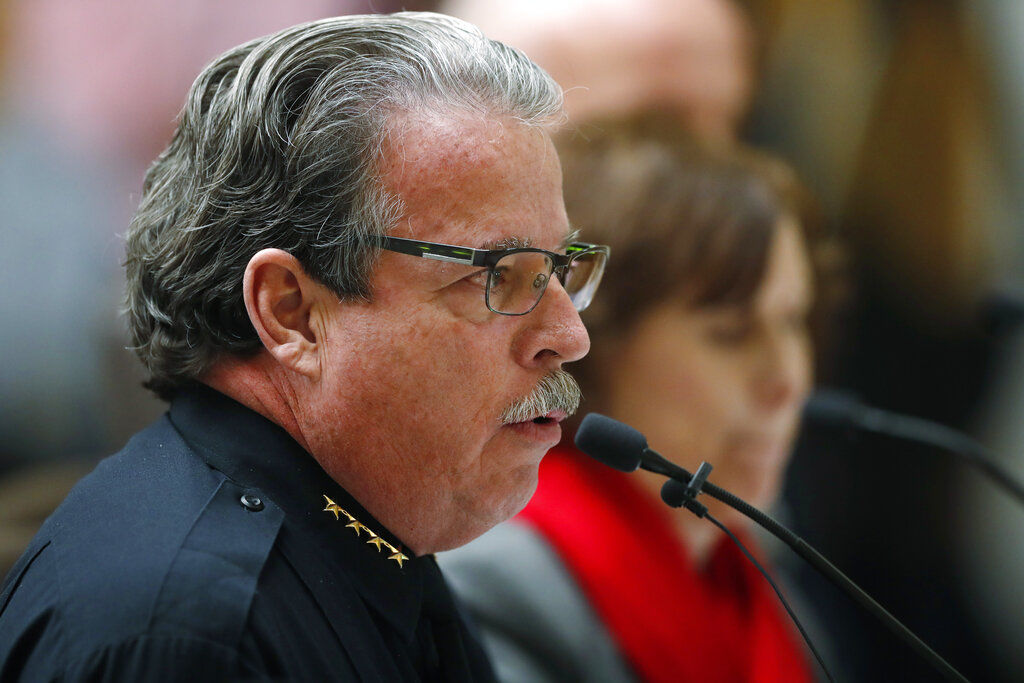Douglas County sheriff’s alleged political firing of subordinate to be heard by jury, judge rules

A jury will decide whether the former Douglas County sheriff fired his subordinate for making a political Facebook post in the middle of the 2020 election, and whether the sheriff’s office has raised a valid defense to terminating her without the proper process.
Holly Kluth, a 32-year employee of the Douglas County Sheriff’s Office, sued ex-Sheriff Tony Spurlock for allegedly retaliating against her based on her First Amendment-protected speech, and failing to provide notice of her impending termination and an opportunity to be heard.
The parties disputed whether Kluth’s workplace performance was the reason for her firing, as Spurlock contended, or if Kluth’s reaction to the Republican sheriff’s endorsement of a local Democratic candidate motivated Spurlock’s decision.
On Sept. 22, U.S. District Court Judge Nina Y. Wang decided there were critical, disputed facts that were best suited for a jury to address. In doing so, she rejected Spurlock’s argument that Kluth’s election-related Facebook post was not constitutionally protected because it did not involve a matter of “public concern.”
“The Facebook post was clearly made to relay Ms. Kluth’s views on the upcoming election and the involved candidates,” Wang wrote. As such, it “addresses a subject – a public election – that the Supreme Court has stated ‘occupies the core of the protection afforded by the First Amendment.'”
In 2020, Spurlock caused a stir when he endorsed Democrat Lisa Neal-Graves for an open seat on the three-member Douglas County Board of County Commissioners. The county GOP had previously condemned Spurlock for supporting a key gun safety law backed by Democrats, and a local party official contacted Kluth after the Neal-Graves endorsement to ask for a statement in support of Republican candidates.
Although Kluth, who was Spurlock’s undersheriff at the time, grew apprehensive about the county GOP’s use of her statement, she posted her views on Facebook “for those that have been asking for the past couple of days where I stand.”
Her post elaborated that she has “known Sheriff Tony Spurlock for over 30 years” and respected him, but she “will support and vote for conservative candidates that I think have the beliefs I do.”
An internal affairs investigation began against Kluth and another sheriff’s employee involved with the GOP’s request for a statement, Tim Moore. Kluth admitted that her role as undersheriff required her to be “in sync” with Spurlock and her post could create a “split.” Spurlock sustained five policy violations against Kluth and demoted her to captain.
In early 2021, Kluth told Spurlock she planned to campaign to succeed him in 2022. Shortly afterward, in May, Spurlock again met with Kluth and told her he was firing her because “nothing had changed since the fall.” Spurlock also terminated Moore the same day.
Kluth subsequently lost the Republican primary election to now-Sheriff Darren Weekly.
“Ms. Kluth’s impressive career was cut short when she found herself on the opposite side of Sheriff Spurlock in factional political dispute within the Douglas County Republican party,” wrote Kluth’s attorneys in filing suit against Spurlock for her termination.
Kluth had not experienced any formal discipline since her demotion from undersheriff, and her new position did not require her to be politically in sync with Spurlock. Nonetheless, Spurlock’s justification for her termination – nothing changed since the fall – suggested he was motivated to fire Kluth because of her election-related post, she argued.
Spurlock, in turn, submitted evidence that Kluth continued to be disagreeable following her demotion. He also alluded to Kluth’s misconduct, including her order for a subordinate to delete some of her personnel records and her alleged dishonesty in her 1988 application to join the office.
In December, both sides asked Wang to resolve some or all of Kluth’s claims without a trial.
As for Kluth’s primary claim, that Spurlock fired her for her election-related speech, Wang decided a jury must weigh in. Although public employees have more limited First Amendment rights, their speech is protected if, among other things, they speak on a matter of public concern and their employer does not have an interest in stifling disruptive commentary.
While Kluth admitted to the importance of avoiding a rift with Spurlock as his undersheriff, Wang noted the lack of evidence suggesting Kluth’s post actually disrupted the sheriff’s office in the months leading to her termination. Wang also observed Spurlock did not clearly explain why Kluth needed to be gone.
“A reasonable jury could find an inconsistency between Sheriff Spurlock’s stated reason for Ms. Kluth’s termination,” she wrote, “coupled with the absence of formal or informal disciplinary actions in her personnel file, which could help support a finding of a retaliatory motive.”
Wang also found that Colorado law requires sheriffs to give deputies notice of their potential termination and an opportunity to be heard. There was “no genuine dispute” that Spurlock failed to give notice, Wang wrote.
Instead, the question for the jury was whether the sheriff’s office could show Kluth’s other misconduct would have provided grounds to fire her anyway.
Because Wang decided Kluth’s First Amendment claim could proceed to trial, she also permitted a related claim to go forward: that Spurlock, as a peace officer, deprived Kluth of her right to free speech under the state constitution. Kluth advanced her claim under Colorado’s 2020 policing reform law, enacted in the wake of George Floyd’s murder in Minneapolis, that was designed to enhance accountability for law enforcement.
The case is Kluth v. Spurlock et al.













